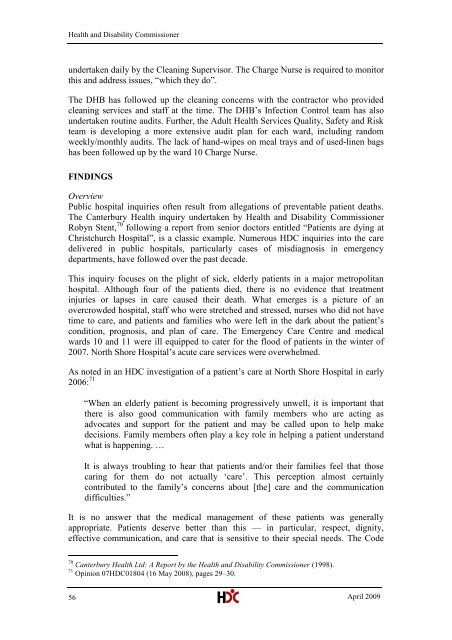North Shore Hospital report - New Zealand Doctor
North Shore Hospital report - New Zealand Doctor
North Shore Hospital report - New Zealand Doctor
Create successful ePaper yourself
Turn your PDF publications into a flip-book with our unique Google optimized e-Paper software.
Health and Disability Commissionerundertaken daily by the Cleaning Supervisor. The Charge Nurse is required to monitorthis and address issues, ―which they do‖.The DHB has followed up the cleaning concerns with the contractor who providedcleaning services and staff at the time. The DHB‘s Infection Control team has alsoundertaken routine audits. Further, the Adult Health Services Quality, Safety and Riskteam is developing a more extensive audit plan for each ward, including randomweekly/monthly audits. The lack of hand-wipes on meal trays and of used-linen bagshas been followed up by the ward 10 Charge Nurse.FINDINGSOverviewPublic hospital inquiries often result from allegations of preventable patient deaths.The Canterbury Health inquiry undertaken by Health and Disability CommissionerRobyn Stent, 70 following a <strong>report</strong> from senior doctors entitled ―Patients are dying atChristchurch <strong>Hospital</strong>‖, is a classic example. Numerous HDC inquiries into the caredelivered in public hospitals, particularly cases of misdiagnosis in emergencydepartments, have followed over the past decade.This inquiry focuses on the plight of sick, elderly patients in a major metropolitanhospital. Although four of the patients died, there is no evidence that treatmentinjuries or lapses in care caused their death. What emerges is a picture of anovercrowded hospital, staff who were stretched and stressed, nurses who did not havetime to care, and patients and families who were left in the dark about the patient‘scondition, prognosis, and plan of care. The Emergency Care Centre and medicalwards 10 and 11 were ill equipped to cater for the flood of patients in the winter of2007. <strong>North</strong> <strong>Shore</strong> <strong>Hospital</strong>‘s acute care services were overwhelmed.As noted in an HDC investigation of a patient‘s care at <strong>North</strong> <strong>Shore</strong> <strong>Hospital</strong> in early2006: 71―When an elderly patient is becoming progressively unwell, it is important thatthere is also good communication with family members who are acting asadvocates and support for the patient and may be called upon to help makedecisions. Family members often play a key role in helping a patient understandwhat is happening. …It is always troubling to hear that patients and/or their families feel that thosecaring for them do not actually ‗care‘. This perception almost certainlycontributed to the family‘s concerns about [the] care and the communicationdifficulties.‖It is no answer that the medical management of these patients was generallyappropriate. Patients deserve better than this — in particular, respect, dignity,effective communication, and care that is sensitive to their special needs. The Code70 Canterbury Health Ltd: A Report by the Health and Disability Commissioner (1998).71 Opinion 07HDC01804 (16 May 2008), pages 29–30.56April 2009
















